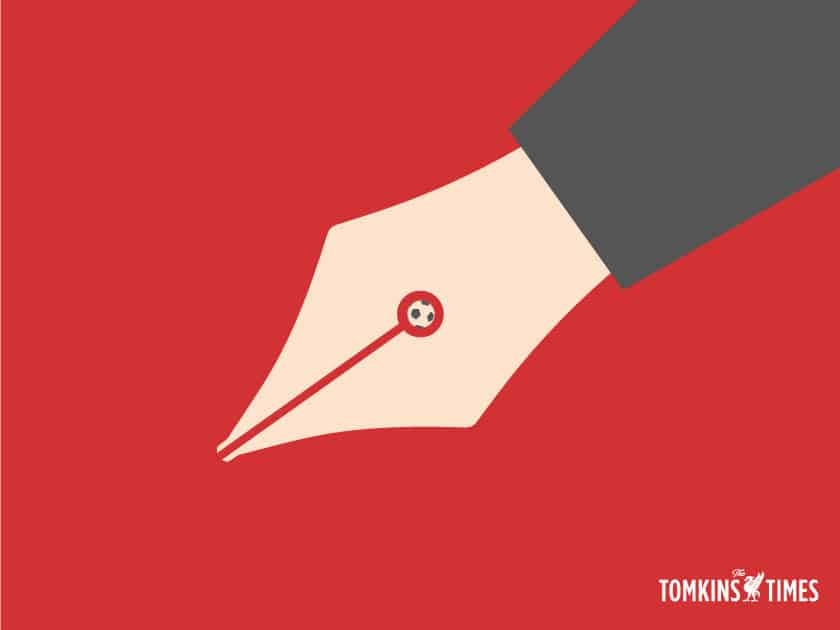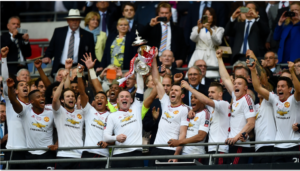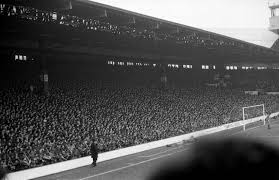
The Old Boys’ Pen
This is the first article from a new panel of Old Boys (and Girls) who will be giving us an idea of how they think football and watching football, has changed over the years.
Bob Pearce:
“We had selfies and instagrams, Spectating round the fields of Anfield Road.”
Look into the crowd at matches today. We see growing numbers of ‘spectators’ present with their cameras held aloft.
Where is their focus? On their tiny little screens. Ensuring that they are doing a good job of capturing ‘the moment’. Thinking about how great this will look. Who they can share it with. How many views they’ll get. How ‘cool’ it will make them. There are even some DIY directors expertly ‘panning’ around to take in what ‘a Lineker’ or ‘a Townsend’ would call the ‘amazing scenes’ ‘in and around’ them.
 Why do they feel this urge to ‘bottle’ the magic of the moment? What do they think they are capturing? What do they think they are capturing this for? Is it to prove they were there? Do they think they are curators seeking to document these magical moments?
Why do they feel this urge to ‘bottle’ the magic of the moment? What do they think they are capturing? What do they think they are capturing this for? Is it to prove they were there? Do they think they are curators seeking to document these magical moments?
The wedding photographer is not part of the wedding party. They are one step removed. They are uninvolved and disengaged spectators. They are not in the moment. Their focus is elsewhere. They are ‘capturing’ the moment. They are postponing their experience of the present until another time.
When my generation are asked about going to a game we can close our eyes and be transported back to the key moments. Where we stood, the temperature, the smells, the straining to see the action. There’s a reason why we can do that. Being fully engaged in the emotional intensity of the moment has branded it into our memories for ever in the highest multi-dimensional format available. We lived our lives in the here and now. We were too busy living to have time to make sure we were seen to be living.
Picture a simple graph. Up this side is the balance of the engaged and unengaged fans. Along the bottom is the quality of the atmosphere. The higher the number of ‘spectators’ the more they detract from the atmosphere they are seeking to curate. There is a place on this graph where there are curators curating a mass of fellow curators. All wedding photographers and no wedding party.
There is hope before we reach that part of the graph Just because you can film it doesn’t mean you have to film it. Switch off that camera and be part of the moment. Your memories will be in multi-sensory, dementia-defying, high-definition. Try it.
But when it comes to those fans whose heartbreak and inconsolable despair is instantly erased when they see themselves on the stadium’s giant screen and become a smiling and waving, neighbour-nudging dignity-free zone…. there really is no hope.
Peter Neall:
The very first time I went to the Kop I was a raw southerner, studying in Liverpool. I had never seen a professional football match.
Suddenly the man next to me dug me in the ribs and said to me ‘we sing ‘ere lad’.
Him: ‘Well why are you here then, just sing’
Me: I don’t know the words
Him: So?
And so I sang, odd phrases., some snippets , some words just behind the rest, but I sang
Him: Eh, if they can’t ‘ear you down there on the pitch your wasting your time
And so I sung loud, and just gave up to the song. I loved it, my heart opened, I stopped being a spectator, a watcher and became, in that moment, a fan.
I have never lost it.
My accent was wrong, my birthplace wrong, but my heart was red. And always has been.
I can never thank him enough, and he is there with me (in my heart) every time I am on the Kop, or indeed at Anfield.
And I hate it when I go and there is no singing, I feel cheated and as if I haven’t done my bit, and I haven’t!
Graeme Riley:
Speaking to my father, a veteran supporter since the 1946-47 championship winning campaign, the role of supporters has certainly changed. It was only in the early 1950s that away fans would attend on a large scale and until the middle of the 1960s would happily mingle with each other.
By the late 1960s trouble was brewing and where this ended is well documented. Until the late 1970s, fans were the embodiment of the club, enjoying a reciprocal relationship with managers like Shankly, but as players became increasingly well paid, clubs seem to have developed a different relationship with their supporters – a more commercial one. With the advent of merchandise (previously you could buy scarves, rattles, keyrings, photos and possibly replica shirts but little else), the game changed, and now supporters are more likely to be seen as targets of marketing rather than part of a family, especially since grounds are almost all full to capacity, meaning one disillusioned supporter can be easily replaced from the long queue waiting for a chance.
The hype of 24 hours television and omnipresent social media has also changed us. We, the fans, have gone from blindly following our team through thick and thin, getting behind them even more vociferously when they fall a goal behind, to becoming a wall of cynicism. “Here we go again” is the stock phrase when Hull grab a lead in the last minute of the first half. It’s no wonder Klopp tries to rouse us from our collective ennui, we used to “suck the ball into the net”, but now just complain that the club’s transfer policy sucks. And even if the club does not listen to social media, it no doubt hears – the people behind the scenes, just like the players, are human after all, and will react.
It’s not all entirely new – I remember back in the 1970s even Shankly complained about the match-going fans after one particularly bad performance, saying something along the lines that the true fans were the ones at home as they never turned against their heroes.
Money has led to a sense of entitlement, both on the terraces and on the pitch with the worst offenders being those clubs who have been successful or whose owners have pumped millions (billions?) into the club. How many of us have shouted at a player for lack of effort, misplacing a pass or missing a tackle? Given that it is their livelihood, it’s unlikely that they do this deliberately, but we still offer them no quarter. I include myself in this, my ire growing year on year, possibly out of frustration when the team fail to reproduce previous successes, until eventually the enjoyment goes out of the game and it almost becomes a burden to watch them, albeit still unmissable. I think I still enjoy the game, but anyone watching me might think otherwise. And sadly this anger transfers itself to other walks of life, whether it is watching another (usually team) sport, or failing to find a shirt in my size at my local clothes shop.
Supporters have no doubt changed, as has the club we support, but this is probably just a reflection of society’s broader change as we become more intense in our calls for instant gratification.

Chris Rowland:
‘Get behind your team!’my mate Bob, a fellow Shankly boy, used to yell, in broadest scouse. Not because there wasn’t enough noise or support, but because some on the Kop were singing ‘Are you watching Manchester?’ or something he didn’t think was the Liverpool Way. ‘Support your own team, never mind those bastards, we shouldn’t even mention them unless we’re playing them” (bit of a contrast with Utd fans there, who sing about Liverpool pretty much all the time!). And thus began my Kop education, at an age we might charitably call impressionable.
I heard how the Kop responded when the opposition scored, in full throttle and before the game had even restarted. In fact barely before the ball had been booted angrily back out of the ball by Ray Clemence. ‘Liverpool, Liverpool, Liverpool’ drowning out any away celebrations. It made away teams think they’d just made a terrible mistake and were about to reap the consequences of their poor judgment. It drove Liverpool forward. It said ‘we’re not gonna take it, you can’t DO that and expect to get away with it.’
Nowadays when the opposition score we slip abjectly into sullen silence borne of years of frustration and adversity, as if we’re just waiting for the worst to happen and this just confirms it. Some even seem to revel in it as it gives them grounds for more criticism of the team, an individual player or the manager.
We can still whip up a storm at times, like nowhere else. But the support element of being a supporter has been on the slide for a long time, just as the relationship between the game of football and those who follow it has altered. We may be fans but in some ways we do behave like consumers now, like customers – though that one crucial distinction, that of voting with your feet and going to a rival, still does not apply. But we’ve paid our money and we deserve our right to complain if we get poor product or service.
Get behind your team.
Allen Baynes:
Has the role of the supporter actually changed? Fundamentally not, in my view, you are there to support your team and it was ever thus. I still see, and feel, the blind passion that I started with in the early 1960s amongst many new reds and many old hands like myself. I still get excited going to the game, always believe that we will win, even if we are 2-0 down with 10 minutes to go. I still get the buzz that I did when I went in the boys pen with my mates,and I get the same buzz with one of those mates today, although a pint or two of Guinness helps!
Interestingly, over the years I have met many reds from far flung parts of the world and have marvelled at their depth of passion for the reds – red hot support is clearly not confined to the land of the purple bins or postcodes beginning with an L!That said, the context in which new young reds come to the game has changed almost beyond recognition; hardly surprising when you consider the world that the 12 year old fan lives in today compared to that of the urchin I was back in the early 60s.
As a lad I paid 5p to go in the ‘pen’, a shilling,out of my two shilling pocket money (10p). So I had the bus fare to and from Kirkby, if it was a match where you had to queue, I used to get 4d, (pence) for a bag of chips from the chippy opposite the Kop. Now, a 12 year old today will almost certainly go to the game with their dad/responsible adult, travel by car, and have a pre-match meal that would cost more than I spent going to the game for a whole season.
They will have a seat, probably a half and half scarf and no doubt need a hot dog at half time – and I bet they go out before the whistle. Most importantly, they probably won’t be with their mates and that means they will get the sanitised match experience that is now on offer. They won’t have someone peeing down the back of their legs which was always one to watch for in the Kop. Sadly, they are unlikely to have the laughs we had on the way to and from the game and in the match itself. If you’ve never got on the 92B after a game you have missed one of life’s great experience bettered only by catching the last bus from Liverpool to Kirkby on a Saturday night.
They also won’t experience the characters that you used to get in the Kop, We always (up to twenty of us from school – Ruffwood) got in front of the barrier at about 1.30 on match days. Just before kick off Big Mick and his mates would come in, ease us from our ‘spec’ and take our place. Mick would hand out the bottles of beer to his mates, sadly not us, and then would collect them in so no gobshite could throw them! Imagine that, he ruled our section of the Kop and kept people in order, including us. He loved our passion and our wit and we thought he was ‘the man’.
Today’s new fan will not experience watching the game while your legs are in perpetual motion. Your eyes watched the game but your legs did a half marathon up and down and sideways through the waterfall of pee that washed down the Kop. You always had to be alert to avoid getting stuck on a barrier and learn how to duck under or weave backwards up the Kop and all the time watching the ball. (This is starting to sound like an event for the Olympics or more likely It’s a Knockout!!)
They won’t feel that power, the kinetic energy of being part of a swaying mass of testosterone, passion and above all else the humour. They won’t experience the rite of passage from the boys pen to the full Kop, that sense of growing up without your parents being there to protect you, discovering life and how to cope with raw edges of humanity that used to populate the Kop when I was a kid.
Clearly, it is a more civilised match day experience today. I don’t believe that new fans today are any more or less passionate than the 12 year old me. They probably have an experience that allows critical/moaning voices to be more easily heard; if someone was getting on your nerves in the old days you just moved, and probably people weren’t as openly critical then as someone may have hit you.
I suppose the great thing that we had in the 60s was Shankly, a living God who just made you feel that if you were a red, you were a chosen one, part of the elect. Then again I guess Jürgen has that impact today if you are 12, or even 65.
Mike Hajialexandrou (TTT Subscriber MikeH):
The people’s derby actually used to be that. I could sit with Blues, they might even get me tickets. Now it’s all vitriol and bad feelings. I wonder if this is related to SKY coverage and the be all and end all nature of the coverage.
Social media..the rise of the anonymous moron.
We all think we know more so we demand more?
People talk about football very differently now to how they used to. It also feels more all consuming because it’s in your face 24/7. I used to either listen on the radio in my bedroom to a commentary or see the result in the paper the following day when I was a kid.
My job is to support my team. I could never leave a Liverpool game early (my kids have been taught the same) and I’m coming from London. I can have negative views but I don’t have to have someone to ‘blame”. I don’t want to be right, I want to be wrong…this has changed. People are desperate to be right, almost at the expense of the team.
Fans have become part of the problem rather than part of the solution. Getting on players backs, who will that help? How many have jobs, where they think it would be a great strategy for their boss or colleagues to prejudge them on little or no evidence and give them a hard time?
Are the fans disconnected from the players? Players’ pay is obscene, they all cheat, they show little or no respect for authority, they are abusive to their opponents – perhaps the fans are a reflection of the lack of honesty in the game?
So yes, I think the role of the fan has changed. Less faith, less support, more disrespectful … though this sounds like society in general.